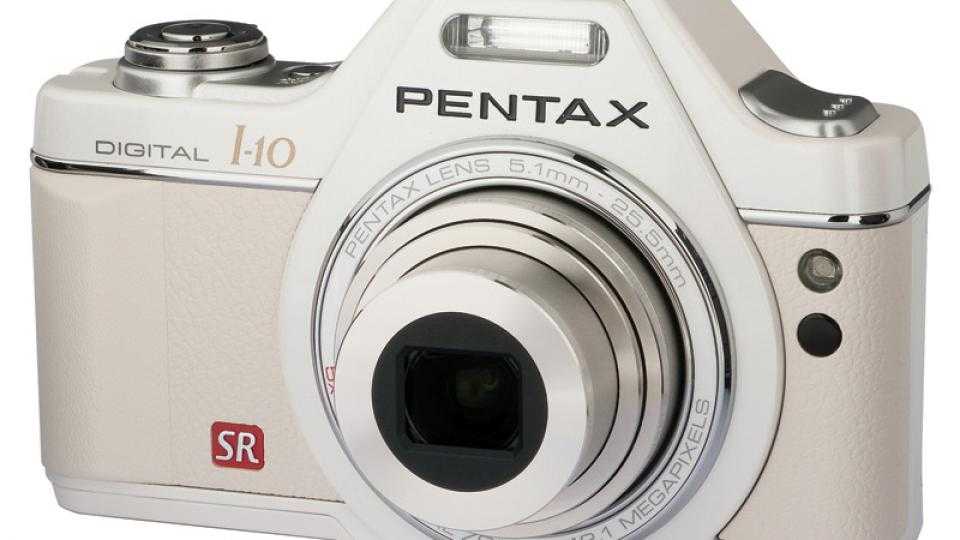After years of competent but bland compact cameras, it’s great to see that Pentax has raised its game in the design stakes. Last month we saw the Pentax H90 with its minimalist, contemporary chic. This month we have the I-10, with a retro design that recalls compact cameras from the 1950s and 60s. Fortunately, it doesn’t emulate vintage cameras’ bulk. The lens fully retracts into the camera body when not in use, and at just 132g, it’s extremely light.
We’re quite taken by the look of the front of the camera, and particularly the white and cream colour scheme, but it isn’t so impressive from other angles. There’s a lump of silver-effect plastic on the top of the camera that’s presumably there to grip onto, but it doesn’t fall naturally under the fingers and cheapens the overall appearance.
The zoom lever that encircles the shutter button looks smart but it’s a little awkward to use because it faces backwards. There’s nothing retro about the controls on the back, with just four buttons and a navigation pad making this an unexceptional point-and-shoot camera in use.
There’s no viewfinder on the back of the viewfinder hump, so shots must be composed on the 2.7in LCD screen. Its widescreen shape means that photos only use a portion of the screen and appear quite small compared to other cameras’ 2.7in and 3in squarer screens. There’s an option to capture widescreen-shaped photos but this discards the top and bottom of the image, reducing the resolution to 9 megapixels.
Operationally, the H90 and I-10 appear to be identical. Their lenses have the same optical design, although the I-10’s metal construction may prove to be more robust than the H90’s plastic.
Their performance, image quality and video quality were all virtually indistinguishable. While the H90 is accomplished for a £100 camera, at £150 the I-10 is a tad disappointing. The one feature that helps justify the I-10’s higher price is its CCD-based stabilisation, which allows it to use slower shutter speeds in low light without introducing motion blur. This stabilisation didn’t perform particularly reliably in our tests, though. With excessive image noise appearing in photos at ISO 400 and above, this isn’t the best camera to choose if low-light photography is on the agenda.
There are no serious flaws and the retro design is appealing, but it implicitly suggests a level of quality that the I-10 can’t live up to. It’s also disappointing that the stylish design of the front of the camera doesn’t continue over the top and around the back. On the other hand, the I-10 manages to stand out in a crowded market. Those who are drawn to its looks and aren’t too fussed about getting the best image quality possible won’t be disappointed. Those who are more discerning should go for our long-standing favourite, the Fujifilm F200EXR .
|
Basic Specifications |
|
Rating |
*** |
|
CCD effective megapixels |
12.0 megapixels |
|
CCD size |
1/2.3in |
|
Viewfinder |
none |
|
Viewfinder magnification, coverage |
N/A |
|
LCD screen size |
2.7in |
|
LCD screen resolution |
230,000 pixels |
|
Articulated screen |
No |
|
Live view |
Yes |
|
Optical zoom |
5.0x |
|
Zoom 35mm equivalent |
28-140mm |
|
Image stabilisation |
optical, sensor shift |
|
Maximum image resolution |
4,000x3,000 |
|
Maximum movie resolution |
1280x720 |
|
Movie frame rate at max quality |
30fps |
|
File formats |
JPEG; AVI (M-JPEG) |
|
Physical |
|
Memory slot |
SDHC |
|
Mermory supplied |
27MB internal |
|
Battery type |
Li-ion |
|
Battery Life (tested) |
250 shots |
|
Connectivity |
USB, AV |
|
HDMI output resolution |
N/A |
|
Body material |
aluminium, plastic |
|
Lens mount |
N/A |
|
Focal length multiplier |
N/A |
|
Kit lens model name |
N/A |
|
Accessories |
USB and AV cables |
|
Weight |
132g |
|
Size |
65x101x28mm |
|
Buying Information |
|
Warranty |
one-year RTB |
|
Price |
£149 |
|
Supplier |
http://www.amazon.co.uk |
|
Details |
www.pentax.co.uk |
|
Camera Controls |
|
Exposure modes |
auto |
|
Shutter speed |
auto |
|
Aperture range |
f/3.5 (wide), f/5.9 (tele) |
|
ISO range (at full resolution) |
80 to 1600 |
|
Exposure compensation |
+/-2 EV |
|
White balance |
auto, 4 presets, manual |
|
Additional image controls |
contrast, saturation, sharpness, highlight correction, shadow correction |
|
Manual focus |
Yes |
|
Closest macro focus |
8cm |
|
Auto-focus modes |
multi, centre, face detect, tracking |
|
Metering modes |
multi, centre-weighted, centre, face detect |
|
Flash |
auto, forced, suppressed, slow synchro, red-eye reduction |
|
Drive modes |
single, continuous, self-timer |
Basic Specifications
Physical
Buying Information
Camera Controls












